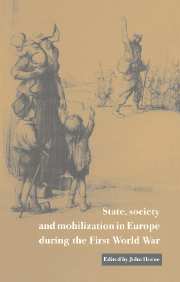Book contents
- Frontmatter
- Contents
- List of contributors
- Preface
- 1 Introduction: mobilizing for ‘total war’, 1914–1918
- I National ideals
- II Solidarities and minorities
- III Army and nation
- 8 Discipline and morale in the British army, 1917–1918
- 9 Remobilizing the citizen-soldier through the French army mutinies of 1917
- 10 The German army, the authoritarian nation-state and total war
- 11 Morale and patriotism in the Austro-Hungarian army, 1914–1918
- IV The limits and consequences of mobilization
- Notes
- Index
10 - The German army, the authoritarian nation-state and total war
Published online by Cambridge University Press: 04 December 2009
- Frontmatter
- Contents
- List of contributors
- Preface
- 1 Introduction: mobilizing for ‘total war’, 1914–1918
- I National ideals
- II Solidarities and minorities
- III Army and nation
- 8 Discipline and morale in the British army, 1917–1918
- 9 Remobilizing the citizen-soldier through the French army mutinies of 1917
- 10 The German army, the authoritarian nation-state and total war
- 11 Morale and patriotism in the Austro-Hungarian army, 1914–1918
- IV The limits and consequences of mobilization
- Notes
- Index
Summary
On the morning of 9 November 1918, Ludendorff's successor as Senior Quartermaster-General of the German field army, Lieutenant-General Wilhelm Groener, faced his supreme warlord and stated drily: ‘The Army will return in good order to its home bases, under the orders of its commanders and commanding generals, but not under Your Majesty's orders, for it no longer backs Your Majesty.’ Groener's statement concisely expressed the collapse of the entire former system of government, as a result of military defeat. The army refused to follow the monarch, thereby touching the very core of how the imperial German state and society perceived themselves. This is not the place to analyse the manifold reasons for the downfall of the German empire. What interests us is whether, and to what extent, the German High Command's response to the changing nature of warfare contributed to this collapse. It may seem doubtful whether the First World War can really be called a ‘total war’, or whether the term ‘total combat’ is not nearer to the reality of 1914–18. What seems certain, however, is that warfare required a hitherto unheard-of mobilization of all resources of both state and society. The question is to what extent the armed forces, the core element of the authoritarian nation-state, managed to cope with the consequences of this mobilization. This chapter attempts a preliminary answer to that question.
In the Prussian-dominated Germany of the late nineteenth century, the military had a double role – to provide national defence and to protect the established social order. Both functions had become much more difficult to perform since Bismarck's dismissal in 1890.
- Type
- Chapter
- Information
- Publisher: Cambridge University PressPrint publication year: 1997
- 2
- Cited by



